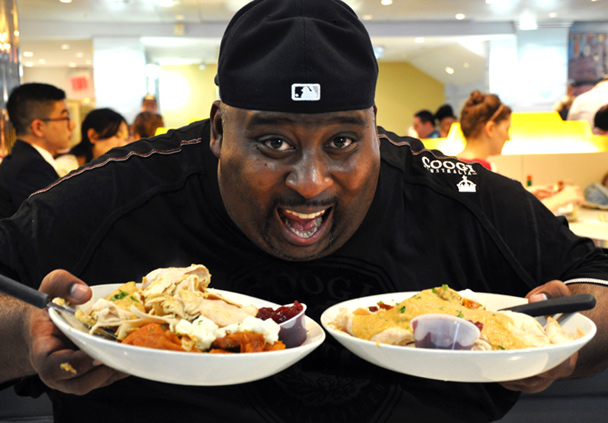It’s the classic dilemma food lovers face every Thanksgiving: How do you maximize consumption while minimizing feelings of discomfort and fatigue? Determined to solve this glutton’s conundrum, I met up with Eric “Badlands” Booker at the Tick Tock Diner in New York City for a firsthand lesson in piling my plate high, chowing down, and still having room for seconds.
There is no better feasting coach than Booker, who at 6' 5" and 400 pounds, is a man who not only knows how to eat but knows how to eat a lot, and quickly. There are people who enjoy eating, and then there is Booker, who has spent the past 14 years perfecting the craft of consumption, and now ranks 15th in the world on the Major League Eating (MLE) circuit. If Thanksgiving is the Super Bowl of food, then this man is the holiday’s MVP.
A native of Queens, New York, Booker got his first taste of competitive eating in 1997 at a qualifying match for Nathan’s Famous hot dog–eating contest, the annual Fourth of July showdown for the world’s elite eaters. After placing first in the qualifying match, Booker came in sixth at the event, and has since placed as high as second, in 2002, when he ate 26 hot dogs and buns.
Since his first showing at Nathan’s, Booker has earned eating records in nearly every food group. Noteworthy claims to gastronomical fame include eating 4 pounds of corned beef hash (1 minute, 58 seconds); 21 baseball-size matzoh balls (5 minutes, 25 seconds); 49 glazed doughnuts (8 minutes); and—just in time for the Thanksgiving dessert bar—4 3/8 Entenmann’s Pumpkin Pies (12 minutes). This is a man who clearly knows his way around an all-you-can-eat buffet.
We grab a booth by the window at the diner, one of the few places in New York City that actually serve a traditional Thanksgiving meal 365 days a year. I order Booker two of the Roasted Turkey Dinner platters, which come with a choice of soup or salad and include a half-pound of sliced turkey, plus stuffing, giblet gravy, marshmallow yams, and cranberry sauce (noticeably absent are mashed potatoes). Booker also orders the chicken noodle soup, and digs in as we start talking strategy.
“Thanksgiving is a time when everyone is a competitive eater,” says the champ, who, along with his wife, cooks Thanksgiving dinner for 15 or so friends and family members. “And at our house, I know it’s going to be like an amateur boxing match—a three-round match, at least,” Booker says, referring to the multiple servings he’ll eat of some of his favorite dishes, including homemade macaroni and cheese, a family recipe for sweet and tangy sausage stuffing, ziti, turkey, ham, chicken, and meatloaf, plus ice cream and several types of pie.
Of course preparation for a big match must begin well before game day. To lay the groundwork before you come face-to-face with your plate, Booker recommends eating a light dinner made up of lean proteins, such as chicken, and salad the night before the feast: The key, he says, is to eat something to prevent your stomach from shrinking, while avoiding weighing yourself down with anything heavy. On the morning of the big day, eat a breakfast of complex carbs, such as oatmeal, which will keep you satiated and make you less likely to snack in the hours leading up to the first bite of the bird. (A word to the wise for cooks: Booker knows there’s no way to get around tasting your creations to see if you need to adjust seasonings, but says to keep sampling to small bites.)
In the Booker family home, the cooking takes place in two shifts. Booker prefers the 10 p.m. to 6 a.m. shift, since he’s used to the hours from his job as an overnight MTA conductor on New York’s 7 train.
Just as he’s putting the finishing touches on the ham and stuffing, his wife steps in for the daytime shift, and Booker retreats from the kitchen to build up his appetite for the main event. One key to success is what you drink leading up to and during dinner. Booker suggests instituting the MLE approach to liquids. “You don’t want to be drinking anything that’s carbonated,” he advises. “It creates bubbles in your stomach, which are not good.”



 Pinterest
Pinterest


